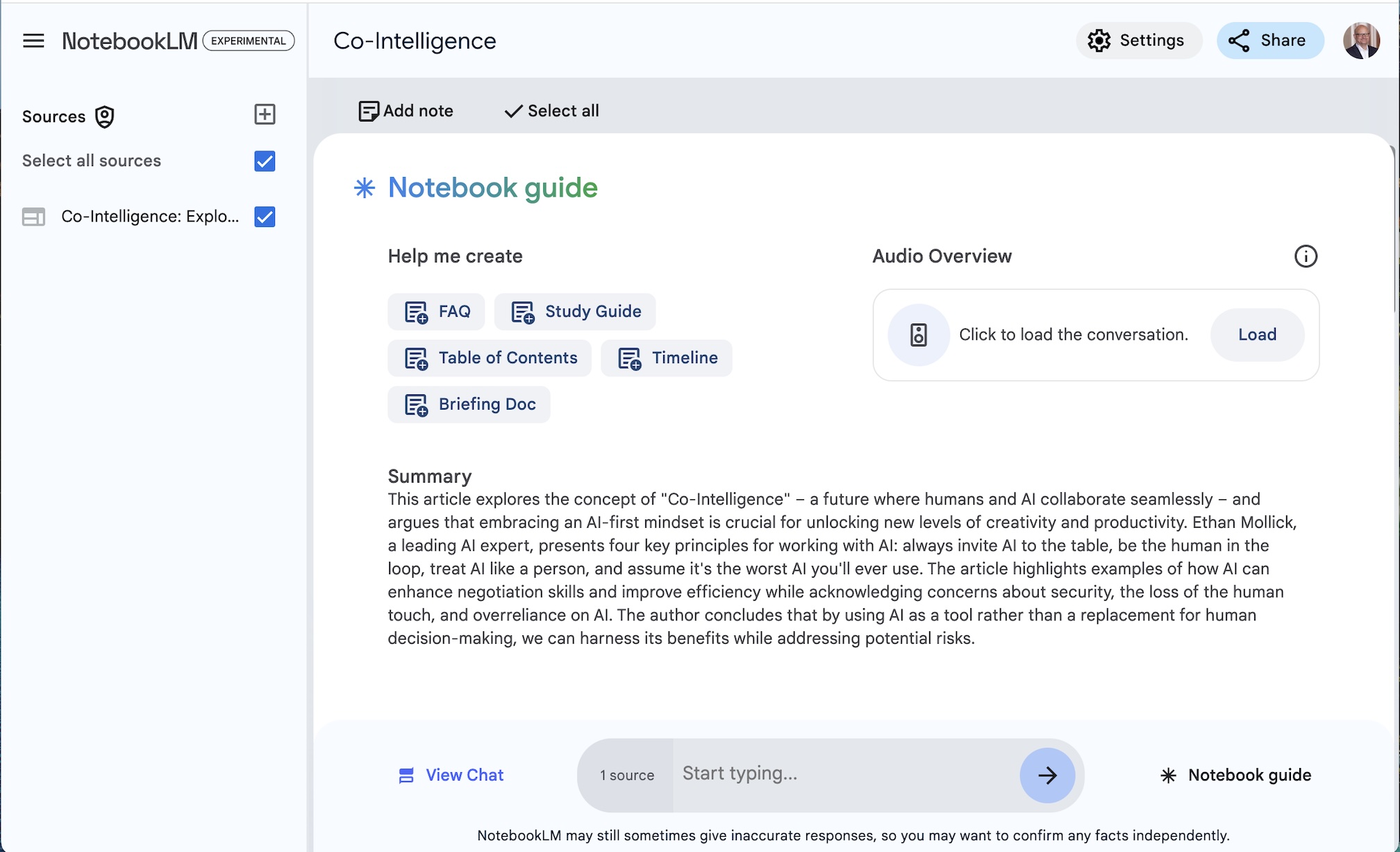
NotebookLM: The Power of an AI Research Assistant
I was recently intrigued by NotebookLM’s capability to generate audio discussions from various information sources, such as legal agreements, web pages, and sales documents. I found myself wondering: What value could I receive from an audio discussion that I couldn’t get from simply reading the information?
Surprisingly, the audio discussions boiled down information to its basics in simple, easy-to-understand terms! The discussions augmented the information source to help listeners quickly grasp key insights.
Please join me as I share my experiences and thoughts on this powerful feature.
What is NotebookLM?
NotebookLM, an experimental offering from Google Labs, is a new type of notebook designed to help people learn faster. In today’s world, many struggle with the rapid growth of information, specifically in synthesizing facts and ideas from various sources. NotebookLM aims to address this challenge by speeding up the process of going from information to insights.
Powered by Google’s Gemini 1.5 Pro Language Model (LLM), NotebookLM becomes “grounded” in the information you upload. This means it creates a personalized AI assistant that is well-versed in your specific content. It can quickly summarize facts, explain complex ideas, and help you brainstorm new connections by answering questions about the information.
NotebookLM Features:
- FAQ: Frequently Asked Questions about the information
- Study Guide: Question and answer guide to help validate understanding, including essay questions and a glossary of key terms
- Table of Contents: Organized structure of the information
- Timeline: A chronological sequence of events (if applicable)
- Briefing Doc: Key themes and takeaways about the information
- Chat: Ability to interactively ask questions and receive answers from the personalized AI
- Audio Discussion: A deep dive discussion on the information conducted by two English-speaking hosts
Power of a Discussion
To better understand NotebookLM’s audio discussion capability, I decided to test it on my blog posts. My initial reaction was WOW! The conversation between the two hosts flowed naturally, interactively, and engagingly. It was very hard to tell the discussion was AI-generated.
Benefits of Audio Discussions
The discussions added value beyond just reading each post by:
- Providing simpler explanations of concepts
- Highlighting key takeaways
- Offering real-life applications of the ideas presented
Examples:
-
In the “Lessons Learned from Creating Code with Generative AI” post, the hosts provided a simpler explanation of the ‘type error’, making it more accessible for non-developers.
-
For the “Co-Intelligence: Exploring Ethan Mollick’s Vision of Human-AI Collaboration” post, the hosts explained how to use the Rashomon AI prompt in real life. They suggested: “The next time you are facing a decision and you are feeling the biases coming in, take a breath and ask yourself: What am I assuming here? Am I seeing the whole picture, or is my brain trying to pull a fast one on me? If you are still feeling unsure, try using the Rashomon AI prompt!”
Limitations and Considerations
While NotebookLM’s audio discussions are impressive, it’s important to note some limitations:
-
Accuracy: Google Labs advises that NotebookLM may sometimes give inaccurate responses, so it’s wise to independently verify important facts, however there isn’t a capability to correct errors you identify in the audio. For example, in the “Co-Intelligence: Exploring Ethan Mollick’s Vision of Human-AI Collaboration” post discussion, the hosts misattributed a negotiation example to Hummel when it was actually Mollick’s example from the book.
-
Misinterpretations: There were instances where the AI slightly misinterpreted or misrepresented information from the original posts. For example, in the “Lessons Learned for Creating Code with Generative AI” post, I emphasized that the dataset used in the ChatGPT model contributed to its improved accuracy. The hosts stated that ChatGPT was superior to Hummel’s model because it used a complex neural network and a larger dataset, which wasn’t entirely accurate.
-
Privacy: Google states that your personal data is not used to train NotebookLM. However, as with any AI tool processing your documents, it’s crucial to consider privacy implications when uploading sensitive information.
Conclusions
NotebookLM’s audio discussion capability adds value beyond just reading an information source. It achieves this by highlighting key insights and sharing examples to enhance understanding, even with its current limitations. The product delivers this through an engaging, podcast-like discussion format. Personally, I also gained ideas on how to improve my own writing and information delivery.
By exploring tools like NotebookLM, we can continue to push the boundaries of how AI can enhance our learning and information processing capabilities. As we do so, it’s crucial to remain aware of both the potential and the limitations of these emerging technologies.
I encourage you to apply an AI-first mindset and test out NotebookLM’s audio discussion capability on your own information sources. I’m particularly curious to learn how it performs with multiple sources of information in a single notebook.
To access a post discussion referenced above, click on the “Listen to discussion about this post” link below the summary of each post on the home page. It is fun to listen to a audio discussion on NotebookLM created by NotebookLM!